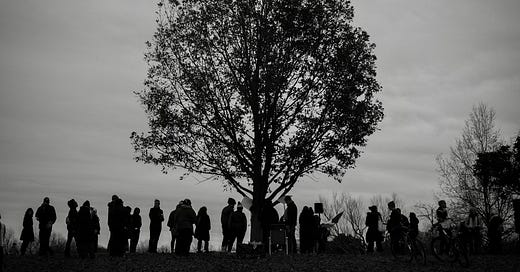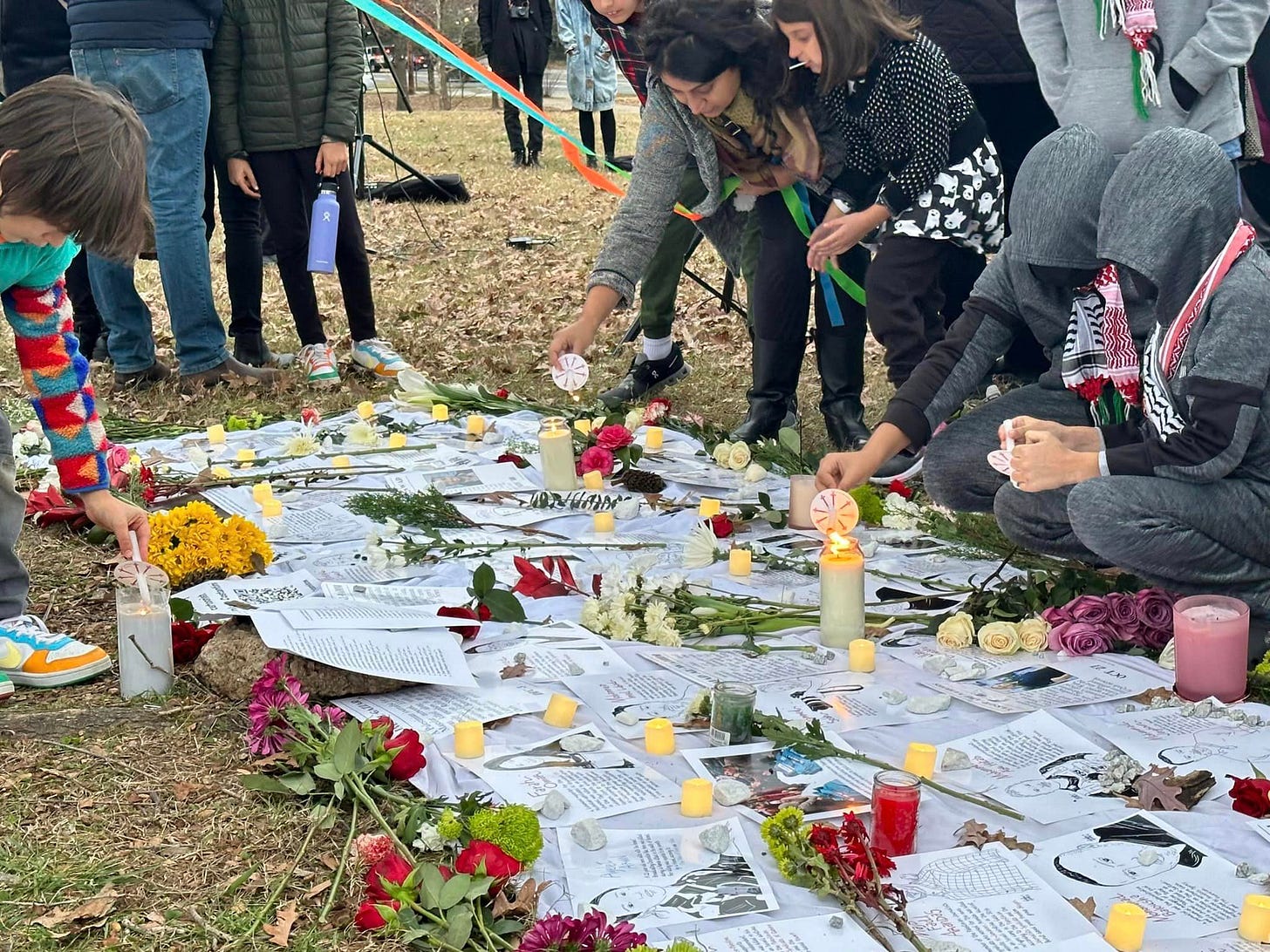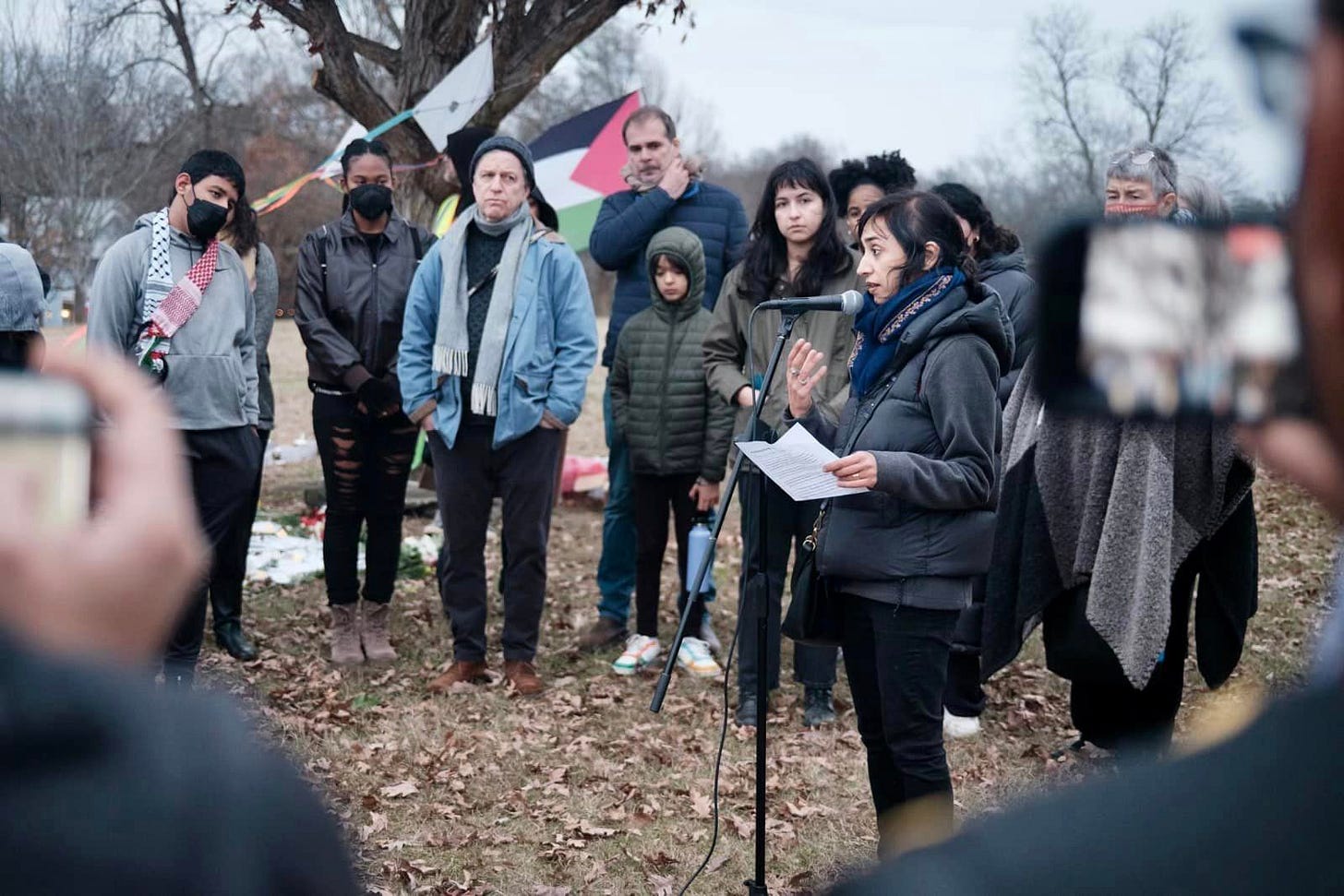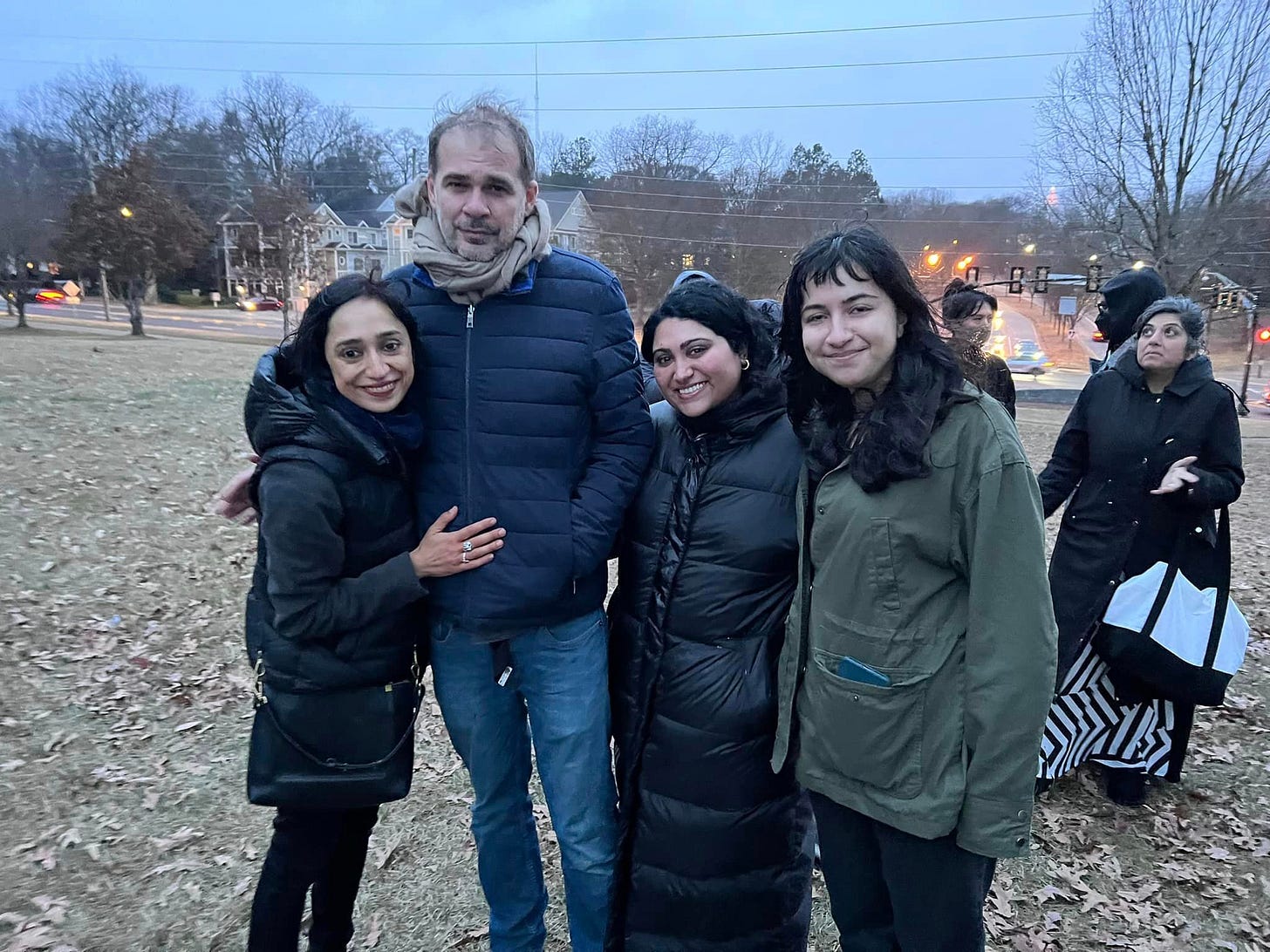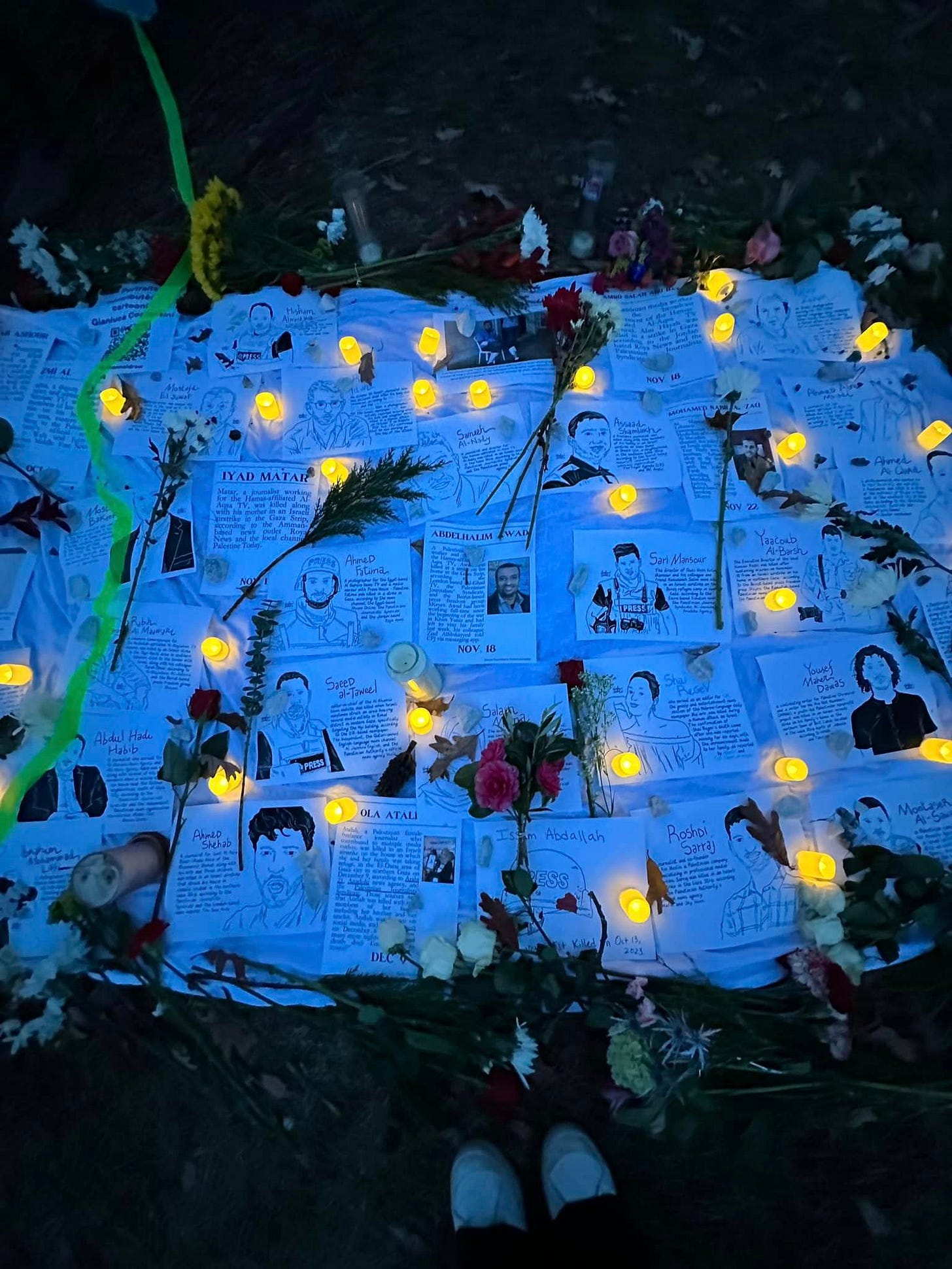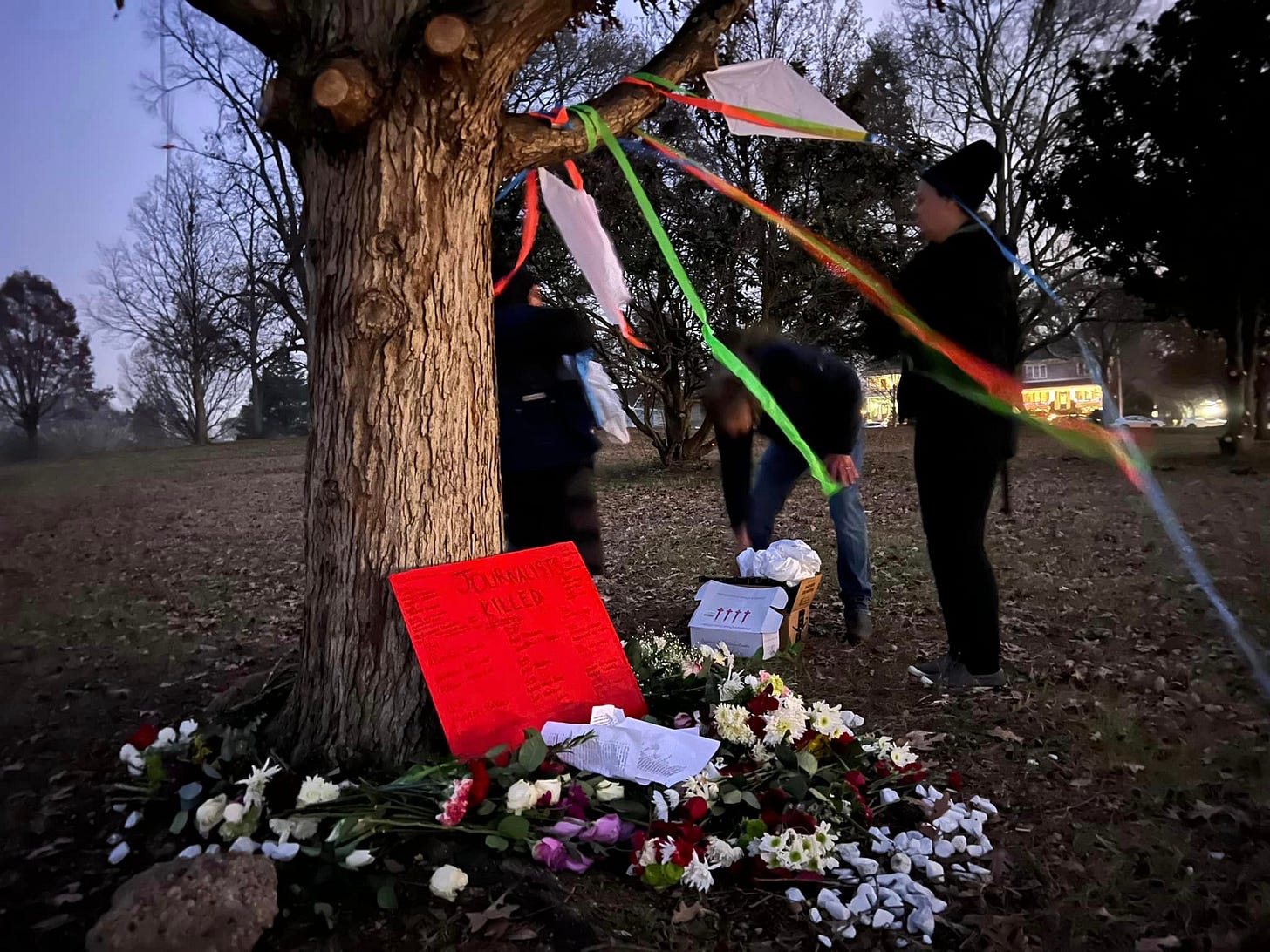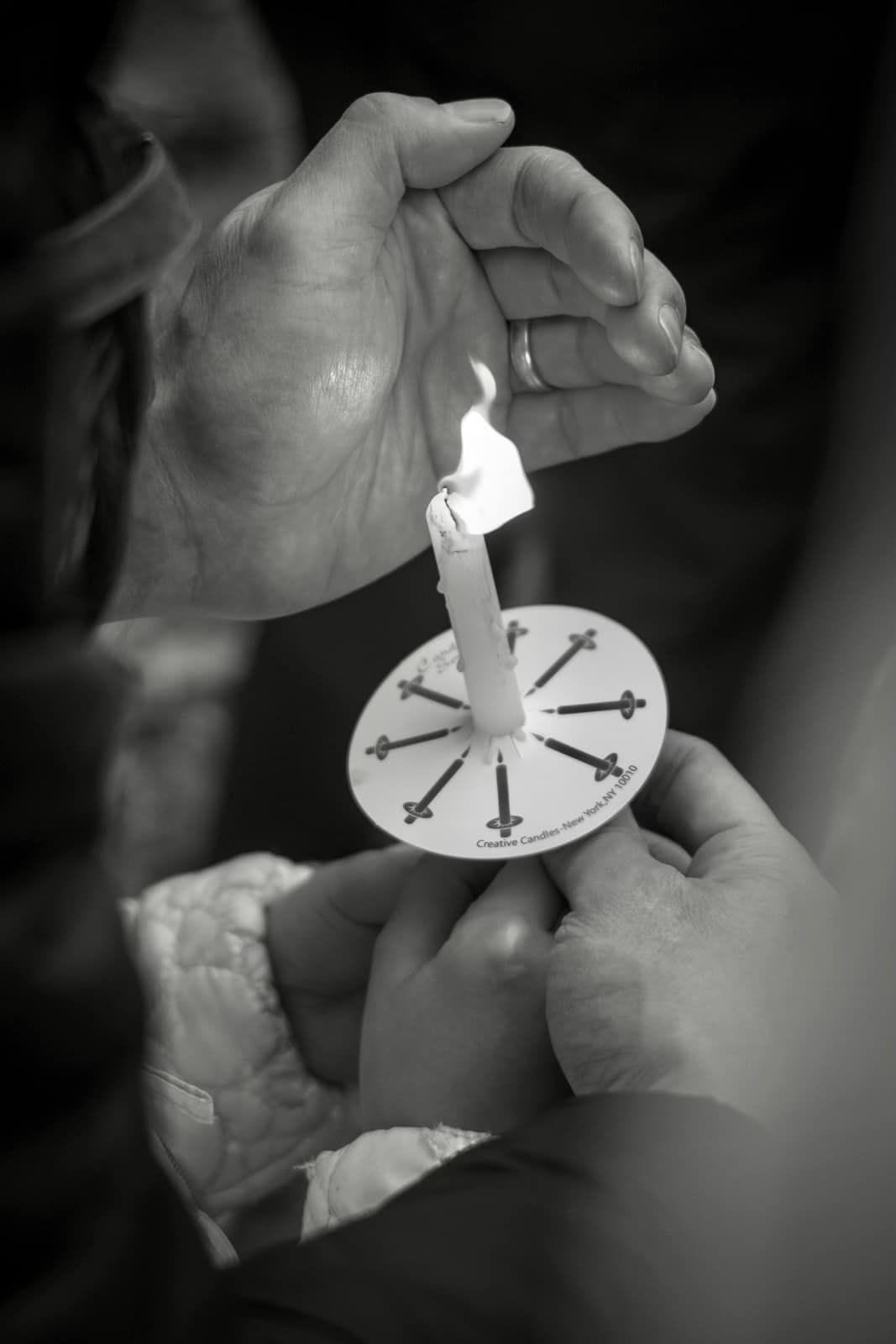Monday Matter: Reflections from a vigil
Today’s issue, a departure from the typical Monday letter, is public.
Every other Monday, I send subscribers and gift recipients of immigrant mental health and storytelling newsletter Foreign Bodies stories I recently inhaled and adored. This is also a chance to do some housekeeping and give shout-outs and all that jazz. Today’s issue, a departure from the typical Monday letter, is public.
Reflections from a vigil
On Saturday, a team of three Atlanta journalists and I organized a vigil for the news workers killed in Gaza, Israel and Lebanon since Oct. 7, most of them local journalists just like us who died covering the nightmares unfolding in their homeland, aching for their international media colleagues in the West—for us—to sound the alarm.
Their deaths make up only a fraction of the nearly 1,200 Israelis killed on Oct. 7th and the 18,787 Palestinians killed so far in Gaza. But their deaths, some investigated to be explicitly targeted by the IDF, also reflect a more sinister tactic of authoritarian governments: one of silencing and repressing a vital, necessary free press, press that disseminates information the global community relies on for news at a time when false narratives and propaganda overwhelm the digital and political realm—a tactic used for eons by authoritarians to erase truth and rewrite history.
“The role of journalists in such a situation is absolutely vital,” Jodie Ginsberg, president of the Committee to Protect Journalists (CPJ), recently told Al Jazeera.
“Particularly in Gaza, where we’ve seen the kinds of institutions that traditionally also help with documentation about the impact, like UN officials, have left. So we’re really only left with the Gazan journalists doing this very important documentation work.”
According to the CPJ, the press freedom organization whom we relied on for the data used in programming, the conflict in Gaza is the deadliest for journalists it has ever recorded. Over the last 71 days, CPJ says at least 64 media workers have been killed in Israel, Lebanon and Gaza; reports from other sources suggest nearly 100 media workers have been killed. These were reporters, photographers, camera operators, TV and radio correspondents, editors, producers, and others who make journalism possible.
The vigil, held at Freedom Park on Saturday, Dec. 16, came together in under a week. It began with a tweet calling out for Atlanta journalists of conscience in response to my seeing Chicago media promote a beautiful evening of remembrance of their own. In no time, I connected with my good friends and fellow local journalists Sonam and Sophia. Mat joined us soon after. In five days, we put together a logistics, programming, security and promotion plan. We had support from a coalition of local media workers representing nearly every major and independent news organization in the city.
This was not a protest or a rally, and there’s a reason for the careful and cautious language and visuals we organizers have used in communications and programming, even if they conflict with our own personal preferences. We wanted to be intentional about creating a space for our press colleagues, especially our Palestinian American journalists and allies, to be able to show up and collectively mourn without fearing retaliation from their employers. If there were flags, signs, or even calls for a ceasefire as were had by a guest speaker, we did not approve or invite such. Again, even if our personal morals have no qualms with this (#ceasefirenow, indeed), I do want to make note of our intentions as I’ve seen some conflicting news coverage and chatter, just in case anyone who attended the vigil is met with backlash from their workplaces.
This was a team effort, and I would not have had the confidence nor would the gathering have been as effective without every single person involved, including the voluntary labor from our peace marshals, WRFG’s Christopher who set up a PA system and provided this audio recording of our remarks, plus the beautiful reading of names by our guest Arabic speaker, Imam Wazir. You can listen to it all here:
Illustrations from the vigil were kindly contributed by extraordinary cartoonist Gianluca Costantini, who sent us his hi-res files for us to print and use as we wanted. The portraits were part of the focal point of the gathering, a tribute beside a tree for guests to decorate with their own candles and flowers, and to spend time honoring and learning about our killed colleagues.
We also hung white kites in remembrance of beloved professor and Palestinian poet Refaat Alareer, who was killed in an Israeli airstrike on Dec. 7. Children asked to fly kites shortly after the speeches ended, and the sight warmed my heart.
As the wind came through in full force and the cold rain threatened us with a storm, we cried with strangers, held each other in our collective grief, made new friends with hearts burst open, reunited with familiar, warm faces. I heard people say they didn’t know they needed this. I didn’t either.
It was heartening to see media workers from every outlet in the metro, but especially dear to hug a few reporters, editors and photographers from my former newspaper; I needed, desperately, for these people I’ve cared about and broken bread with to acknowledge what we are seeing happening to our colleagues in Gaza. I needed to know they care as much as I would hope, especially as they haven’t been vocal about any of this online.
It was also heartening to see neighbors who I’ve only met or spoke with once or twice; oh how lucky I am to call them neighbors. It was pleasantly surprising to even have local restaurants and businesses share fliers for the vigil on their window displays. I was giddy (and can’t help but laugh) about seeing my parents front and center, recording every moment. I didn’t expect they would make the trek in the cold and rain considering my mother’s health and inability to stand on her feet for very long.
I was heartened by all the people who I’ve known tangentially or from social media or just through a friend of a friend or, best of all, the people I got to meet for the first time ever, who I can’t wait to be in more community with as hurting, feeling, loving kin. I was, as always, heartened by my dear, dear friends who helped set up, clean up, wipe my tears, feed me, hold me, even if I haven’t been able to be the best kind of friend these last few months.
I was disheartened, however, by the absence of some, especially working journalists in my circles and my own mentors in the field, but I do not want to use my time now to write from hurt. I want to write from love, from gratitude, and remember the purpose here was to honor the dead, and honor them we did, honor them we will continue to do. My dear journalists, press colleagues in Gaza, we hear you. And we won’t let the world forget.
To all who showed up, some examples of your impact: There are rumblings of press colleagues planning their own vigils in Detroit, Baltimore, Connecticut and Australia. A Chicago organizer and I are working on a tip sheet for journalists who have no idea where to start to help create a safe, effective event that doesn’t put press guests at risk. Tomorrow, New York media workers are holding a gathering in remembrance at the New York Public Library. And over the weekend, Bristol, U.K.-based press workers also held a vigil. Will your city be next?
Resource(s) of the week
Something helpful and interesting and cool (*storytelling opportunity)
Watching war unfold is distressing — here's how to protect your mental health: NPR’s Malaka Gharib, who has reported on child trauma in Ukraine, Rohingya refugees and Bangladesh and the Syrian civil war, offers expert advice from psychiatrist Arash Javanbakht for those who feel guilty for looking away
Gaza eSims: Purchasing eSims allows people within Gaza to connect to the outside to communicate with their families during communications blackouts and also to show what’s happening within Gaza
What I’ve been reading lately
‘The bombs are still falling. My heart breaks every day’ (Irish novelist Sally Rooney in conversation with British-Palestinian author Isabella Hammad, The Guardian): “I’m at a loss to understand this. Nothing can make sense of it. Everything in me rebels against what I’m witnessing. And I think of everything I’ve written to you until now, about geopolitics, about public opinion in the west, and I think: how pointless! Some celebrity said something on Instagram, and I’m asking you whether this is cause for optimism, really? When every time I pick up my phone I’m seeing footage of destroyed neighbourhoods, grieving mothers, mass graves. It makes everything I have to say feel absurd and disgusting. In these moments I lose faith in language, in conversation, dialogue, everything. The only word that means anything to me at such a moment is the word: No. And all I want to do is repeat it to myself again and again, seeing these images of devastation and suffering. No, no, no.” Read here.
Notes on Craft: Writing in the Hour of Genocide (Fargo Nissim Tbakhi, Protean Mag): “We must be engaged in this kind of writing, which calls others into mobilization, generating feelings within our audiences that cannot be dispersed through the act of reading, but must be carried out into collective action. You sit, you read something, you feel grief or anger or joy, you get it all out, you put it down, you go about business as usual—this is the coercive affective system that Craft insists upon. We must write in such a way that there is no business, there is no usual.” Everything I needed to hear as a writer currently stuck in a silent academic institution. Thank you, Fargo. Read here.
Palestinian Suffering Is Never As Urgent As The Counterfactual (Samer Kalaf, Defector): “Hypothetical peril was treated more urgently than actual slaughter, and then it was mobilized in service of eradicating basic expressions of Palestinian consciousness and solidarity.” An essay that perfectly sums up what many of us are feeling. Read here.
Among the Protesters (Adam Iscoe, The New Yorker): “Before another demonstration against Israel’s killing of civilians in Gaza, activists gather to make posters and paper poppies, and to discuss the danger of stating their views publicly.” Read here.
The More of Us There Are, The More of Us There Are (Harron Walker and Nan Goldin, n+1): “Solidarity is the answer. The more of us there are, the more of us there are. I feel a deep, tactile pain. The more of us there are, the more difficult it becomes for them to justify this genocide.” An essential interview with renowned photographer Nan Goldin, who recently boycotted the Times, about protesting Zionist institutions and disrupting business as usual on the cultural front. Read here.
Over 60 Journalists Have Been Killed in the Israel-Gaza War. My Friend Was One. (Lama Al-Arian, The New York Times Opinion): “As a journalist, I’m used to reporting the nightmares others live through… I used to think... the horrors I’ve seen others endure would allow me to bear my own with some perspective when it was my turn. But it hasn’t.” Lama, a good friend of friend and fellow vigil organizer Mat Skene, shared some words for us to read aloud, available to hear in the audio file above. Read Lama’s essay here.
I’ve also compiled readings related to Gaza and Israel, all shared in previous issues of Foreign Bodies, into one place. I’ll continue to update this page. This list of readings is primarily for anyone itching for more clarity, knowledge, understanding or solidarity around what’s happening in Palestine, Israel and more.
New research or analysis 📑
Recent immigrants saw biggest spike in mental distress as anti-immigrant sentiment increased (University of California-Los Angeles): New research out of UCLA shows the rate of serious psychological distress more than doubled for immigrants in the U.S. in fewer than five years, largely due to anti-immigrant rhetoric and policies. Read here.
Bookshelf
Books and collections I’m currently reading (plus reader-recommended works!)
Just finished: Minor Detail by Palestinian author Adania Shibli, a novel that “begins during the summer of 1949, one year after the war that the Palestinians mourn as the Nakba—the catastrophe that led to the displacement and exile of some 700,000 people—and the Israelis celebrate as the War of Independence. Israeli soldiers murder an encampment of Bedouin in the Negev desert, and among their victims they capture a Palestinian teenager and they rape her, kill her, and bury her in the sand.” (New Direction Books)
Did you absolutely hate this? Notice any link snafus or grammatical issues? Open to criticism and suggestions.
Special thanks to our growing Foreign Bodies Sustaining Members for keeping this newsletter going through all my ups and downs

